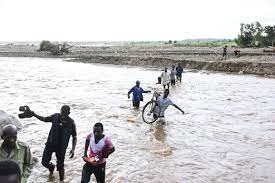UNITED NATIONS, Mar 24: India has high ambitions for improving its water sector and the ‘Namami Gange’ mission for the rejuvenation of the country’s longest river is a “beacon of hope” and an inspirational story, a UN delegate highlighted at the ongoing water conference here.
The UN 2023 Water Conference – formally known as the 2023 Conference for the Midterm Comprehensive Review of Implementation of the UN Decade for Action on Water and Sanitation (2018-2028) – is currently underway at the UN Headquarters.
Co-hosted by Tajikistan and the Netherlands, the March 22-24 conference will result in a summary of proceedings from the UN General Assembly (UNGA) President Csaba Korosi that will feed into the 2023 session of the UN High-level Political Forum on Sustainable Development.
The Ganga river is one of the iconic and vital streams in society that “help us understand the importance of how we deal with the critical resource,” said Special Envoy for International Water Affairs for the Netherlands and Sherpa of the UN 2023 Water Conference Henk Ovink.
He was speaking at a session on ‘Namami Gange – An integrated and holistic approach towards conservation and rejuvenation of River Ganga and its ecosystem.’
Ovink said the Ganga river also “shows us how vulnerable water can be in the context of our growing societies. And, if we invest in that river and that resource, we can survive.”
Minister for Jal Shakti Gajendra Singh Shekhawat also addressed the session organised by the Permanent Mission of India to the UN on Thursday on the margins of the ongoing Water Conference.
Ovink said the ‘Namami Gange, Mission for Clean Ganga’, is giving an inspirational story on how to change course at a time when the world is grappling with the challenges of the water crisis.
“The Clean Ganga mission, the mission of India and the way it deals with water are a beacon of hope,” Ovink said.
“By putting water central to our work, we can achieve a healthy environment, justice in our society, opportunities for women and girls, build resilience, curb biodiversity loss, combat climate change and forge partnerships… I take a lot of inspiration in the partnership that we have with India,” he said.
Minister Shekhawat stressed that people’s participation was the most critical factor in ensuring the success of the ambitious initiative.
“People of the cities and rural areas, living on the banks of the Ganga, have come together, joined hands for the success of this mission and for restoration of this pristine river,” he said.
Apart from delivering the national statement at the General Debate, Shekhawat spoke at key events hosted by the Permanent Mission of India to the UN on the margins of the Water Conference.
He highlighted India’s initiatives on WASH (Water, Sanitation and Hygiene) at an event ‘WASH as a driver of improved health’.
He also addressed members of the Indian-American community at a diaspora reception hosted at the Consulate General of India in New York.
Denmark’s Minister for Environment Magnus Heunicke also spoke at the event and highlighted his country’s cooperation with India regarding sustainable and reliable water.
“It is a great honour for Denmark to work together with India on the green agenda and on the important topic of water,” he said.
Heunicke noted that in 2020, India and Denmark joined forces in their green strategic partnership, with water as one of the key pillars.
He said Denmark can learn a lot from India.
“India has its eyes set on the future. India has high ambitions for improving the water sector. India wants to ensure clean water for a growing population and India wants to do it fast,” he said.
Underscoring the importance of good corporation and partnership to achieve results, he said Denmark wants to further strengthen its ties with India.
Heunicke said it was a matter of pride for Denmark that under India’s G20 Presidency, Copenhagen has been invited to two working groups in the Sherpa track.
“This is the first time in Danish diplomatic history and here Denmark can and will contribute with knowledge, expertise and input. The potential is endless,” he said.
He voiced confidence that the India-Denmark partnership holds “so much potential” not just for the two nations but also for the world.
The Ganga is India’s most important and iconic river. It flows down from its glacial source in the high Himalayas to course through five states in the northern plains before draining into the waters of the Bay of Bengal through the Sunderbans delta, the largest mangrove system in the world.
The river Ganga constituted 28 per cent of India’s water resources and supports about 43 per cent of its population. The National Mission for Clean Ganga (NMCG) is the implementing agency of Namami Gange. Guided by a holistic approach, the focus is on the restoration of the riverine ecosystem. (PTI)
Trending Now
E-Paper


